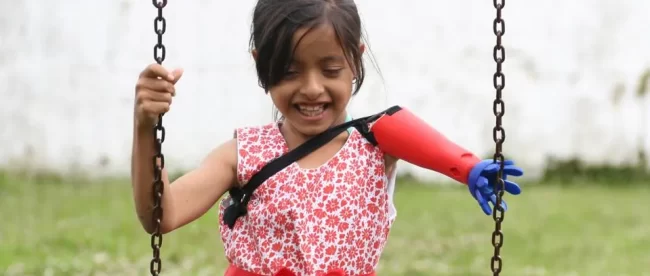Autofabricantes: Transforming Lives Through Personalized Prosthetics and Inclusive Healthcare
Fran Díaz, the founder of Autofabricantes, has embarked on a mission to transform the prosthetics industry, with a particular focus on improving the lives of children who require prosthetic devices. He recognized a glaring issue in the industry before starting his venture: prosthetic devices were often one-size-fits-all, failing to account for individual preferences and specific needs. This oversight was compounded by the exorbitant costs associated with these devices, making them inaccessible to many. In Spain, for example, the price tag for a single prosthetic device was a staggering 20,000 euros or more. Autofabricantes was established to address these issues, using 3D printing technology to revolutionize the design and production of prostheses.
What sets Autofabricantes apart is not just the use of 3D printing technology, which has become more widespread, but their unique decision-making methodology. They make users, including children, an integral part of the design and production process. This user-centered approach results in prosthetic devices that are highly effective and personalized. While Autofabricantes has a team of professionals, including engineers, designers, and therapists, the true experts at the heart of their process are the individuals who will be using the prosthetics, whether they are children or adults. Furthermore, Autofabricantes makes their designs open-source, allowing people worldwide to access and download them.
An illustrative success story from Autofabricantes revolves around a shy young boy named Leo. When Leo visited the workshop, he was encouraged to participate in the design process by choosing the colors and features of his new prosthesis. The outcome was astonishing—Leo returned to school with newfound confidence, proudly showcasing his colorful and cheerful prosthetic hand to his classmates. This transformation in his sociability highlights the impact of personalized prosthetic solutions.
Fran Díaz’s work extends beyond Spain, with projects initiated in Mexico and Colombia. In Colombia, Autofabricantes collaborated with NGOs and government organizations to address the needs of individuals affected by the armed conflict. They shared their expertise and collaborated with local groups to establish teams similar to the one in Madrid. These experiences informed their expansion efforts, leading to the establishment of permanent teams in Mexico and plans for further expansion in Uruguay. Autofabricantes also actively collaborates with community organizations, assisting them in conducting clinical studies and long-term assessments.
Autofabricantes has had a global impact, with their open-source designs being downloaded more than 3,000 times. Feedback and interest have poured in from diverse regions, including Asia, Latin America, and various parts of Africa. Autofabricantes encourages others to adopt their designs and principles to help even more individuals worldwide.
Looking ahead, Autofabricantes seeks to collaborate with public institutions, civil associations, and private sector groups to integrate their solutions into public health approaches, both in Spain and on a global scale. They also require funding for clinical research trials to support their ongoing development. Fran Díaz’s grand vision for healthcare extends beyond prosthetics; he envisions a healthcare system where inclusivity and patient involvement in decision-making are the norm. To achieve this goal, he calls for public institutions to champion this new and inclusive vision, which has the potential to transform healthcare for the better.
Watch the video playlist below and visit Autofabricantes’ website to learn more about them.
Source: Forbes


Leave a comment